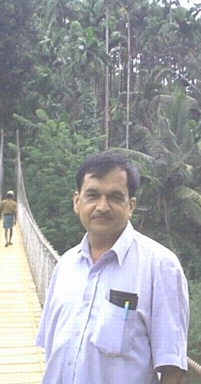Girish Bharadwaj's affordable, reliable foot-bridges are changing village economies and social prospects
Frequently, when we despair of where India is at the moment we do one of these three things: first we turn on the Government and critique it for all ills, next we decry 'apathetic, lazy Indians' who do nothing for themselves and finally, we propose solutions from elsewhere and moan in exasperation ,"why can't we simply, just, etc....?" Here's a story which will convince you that --uncelebrated by the main media and consequently, you-- whole communities are pro-active, innovative and do not wait for the Government to help them. All they usually need is a sensitive individual to make their dreams come through. Individuals like Girish Bharadwaj.
Lush and locked:
The western Ghats around the border of Karnataka and Kerala are a bewitching sequence of green hills and valleys, balmy sunshine, friendly smiles, ample houses -- and countless rivers. They are of all kinds and variety. The hills soak the rains and create streams, waterfalls, rivulets and whole rivers. They sustain the people --but oftentimes cut them off from mainland life.
There are hundreds of villages in these parts that need to use boats or coracles in their daily lives. To an occasional visitor this is a rather charming way of life. The mind is drawn to imagining how lovely it would be to live here without a care or a stress. You could too, unless you have children you want to send to school or college everyday or commute to a job or care for illnesses or have friends and relatives visit you with ease or wanted stable power and telephones. Around the monsoons the streams swell and cut the villages off. When they are in ebb children and the elderly must wade in the mud to reach the boat. For women it's an indignity to hitch their sarees up to their knees. Frequently, young folk have found it hard to find brides or grooms: 'alliances' in places that may be cut off for months scare Indian families.
The story of how Girish Bharadwaj came to make a difference is interesting. His ancestral village, Arambur, in Aletty district is near Sullia town on the western slopes of Kodagu. But his family had moved long ago. His father was an engineer and Girish was born in Mangalore in 1950. He went to an engineering college in Mandya near Bangalore with only occasional visits to Arambur. Indian engineering curriculum of the seventies was --to put it charitably-- classical. Not much emphasis was laid on experimentation or innovation. You got the sums right and you passed out into a world that hopefully taught you how to apply your basic knowledge.







